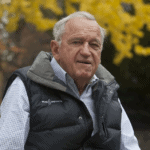Prof. Roland Siegwart explains what it takes to bring scientific inventions rapidly to the market and to strengthen the Swiss startup ecosystem.
How do you bridge the divide between scientific research and market-oriented entrepreneurship?
You could argue that both science and the market serve the same goal, namely, to benefit society. There shouldn’t be a big divide between them. However, scientific solutions to mankind’s problems need to be brought to the market to have an actual impact. ETH Zurich offers an environment of tremendous innovative strength. But we still need to foster the entrepreneurial mindset here as well, even if there is no simple recipe for doing so. Entrepreneurship is a question of culture.
When did you first come into contact with entrepreneurship?
Already my PhD project became the first product of an ETH spin-off company that was founded in 1988 and I joined in 1989. Later on I was appointed professor at EPFL in 1996, and science has been the main focus in my life. But my driver was never just pure science, but its utility in real life. So it was only natural to be involved in several other startups of my lab at EPFL and after 2006 at ETH. One of them, Bluebotics founded in 2001, was recently acquired by Ernesto Bertarelli’s technology fund. Since then, around 15 startup evolved out of my lab.
“There is a clear need to have strong ties between the corporate sector and the universities.”
How do you try to transmit this entrepreneurial spirit to the next generation of scientists?
As a director of a lab you can give it a certain culture. But during my time as ETH’s Vice President for Research and Corporate Relations from 2010 to 2014 I also launched specific initiatives like the pioneer fellowship at ETH, where around a dozen fellows per year receive a grant of CHF 150’000 to transfer their scientific findings to products. I also initiated the Innovation and Entrepreneurship Lab, was co-founder of the Kickstart Accelerator and support innovation through the Gebert Rüf Foundation. In my opinion there is a clear need to have strong ties between the corporate sector and the universities.
With all those initiatives already in place, you still found the time to become co-director of the accelerator Wyss Zurich. What is its role?
Wyss Zurich has a clear mandate to further accelerate technology transfer in fields that require important funding and thus bridge the Valley of Death. In this regard, Europe and Switzerland lag somewhat behind the US. Our start-up companies develop slower because they receive less capital, but they have a higher survival rate. With Wyss Zurich we can give a boost during the very early phase of a startup, when it is most needed and support them to find the best partners for further growth.
What does Wyss Zurich focus on exactly?
Our focus is on regenerative medicine and robotics. We have inhouse technology platforms to help startups, such as biomedical clean rooms to manufacture clinical-grade products and engineering and prototyping facilities.
How clearly did Hansjörg Wyss, who founded the accelerator with USD 120 million spell out the goals?
What I find fascinating about him is his clear strategic thinking and how deeply he was involved. One thing he specified is that it should be a joint accelerator of University of Zurich and ETH Zurich. This prerequisite doesn’t always make life easier, because these are two large entities with their own dynamic. But this kind of cooperation is very inspiring and a strong asset. I think Hansjörg Wyss saw very clearly that successful technology transfer in regenerative medicine requires robotics to automate the processes and production.
“Hansjörg Wyss saw very clearly that successful technology transfer in regenerative medicine requires robotics.”
What does a start-up need to be accepted to Wyss Zurich?
First of all, we don’t accept already established companies. What we look for are outstanding scientific results with a big potential and a great teams. Now, when it comes to the projects, they need to show excellence in science, which means that the researchers that are working on them should ideally be among the leading scientists in their respective field worldwide. They should also have some kind of proof of concept that shows the potential of their idea, be that a working prototype in robotics or proven concept in animal experiments for medicine.
How much money does Wyss Zurich invest?
We help each project with about CHF 1.5 million over 3 years, paying for salaries. With medical projects, that usually take longer to mature than robotics projects, we additionally finance the first clinical trials. In return, we get a stake of around 10-20% of the startup once it is founded, You can compare this with seed funding from business angels, but our goals is not to get rich but to ensure the long-term viability of Wyss Zurich.
There are 10 projects ongoing at the moment, and 2 completed already. These companies will go out and seek funding to speed up their growth. What does “Wyss Zurich” mean from an investors perspective?
I hope that Wyss Zurich startups stands for high quality and potential. The label already is a real asset for our startups, which became evident during the first financing rounds. But this kind of quality control is inherent to other programs such as Venture Kick as well. The key difference is that our projects get good traction faster, because they receive a big push early on.
“I hope that Wyss Zurich startups stands for high quality and potential.”
Is that also true of the two “Wyss Zurich” startups, Hylomorph and Seervision, that have found financing from investiere?
It is evident that Seervision has really sped up the development of the company in the last few months because they received the means to hire more people. And the main founder of the company certainly has huge entrepreneurial drive! Hylomorph, with its anti-fibrotic solution for medical implants, is one of our first projects at Wyss Zurich. It is a great example of how excellence in research can lead to highly valuable novel medical technology.
However, what I am most excited about are the incredibly interesting new jobs and societal values that are created by our startup companies.
When I saw another project from Wyss Zurich, the quadrupedal robot ANYmal, I wondered what the market for this would be.
There are many locations that are not accessible for robots with wheels or tracks. ANYmal might be used on oil platforms or on wind farms out in the sea, for example, where human interventions are very costly. We should not forget that many work environments are hazardous, think about mines or buildings destroyed by a natural disaster. ANYmal, which comes out of the Robotic Systems lab of my colleague Prof. Marco Hutter, is a typical project where you absolutely need a prototype so that prospective clients can see what the robot is capable of.
A powerful accelerator like Wyss Zurich does not come cheap. Your technology platforms alone cost CHF 5 million every year. In this regard, Zurich can be grateful for philanthropists like Mr. Wyss. But when you think about the local startup ecosystem in general, what do you think would still need further improvement?
Our entrepreneurs need to think bigger than they’re used to. They typically have very high ambitions when it comes to technology, but usually they don’t strive for international leadership and scaling. I hope Wyss Zurich will change this mentality and our startups will attract investors in Switzerland that are ready to think bigger as well. If this succeeds, it could lead to a whole new dynamic for the Swiss startup ecosystem and excellent startups from ETH or EPFL are not just acquired by the giants from Silicon Valley.
Do we need more professors with entrepreneurial ambitions?
An entrepreneur thinks about the market first, a scientist thinks about the scientific challenges first. Some people are able to combine these two views. And yes, we could use more of these people. But there is a trend that is working against this, namely that in engineering the academic career starts very early. People go from their PhD directly to the position of professor, without being able to gather entrepreneurial experience in the industry. Furthermore, our young talents are carefully scouted by the IT giants like Apple, Google and Facebook, and hired away even before they can consider transfering their scientific results to a startup.
You also invest in startups yourself. Why?
I am a small investor and only own shares in companies that I have a direct relationship with, typically startups spinning out of my research lab. For me, being a shareholder means to be excited about the products and to believe in the success of the company. Many people invest in companies similar to gambling in a casino, which is a very bad development of the last two to three decades. One should never buy shares of a company whose business one does not understand and whose products one is not excited about. Shareholders should see themselves as part of the company and make long-term financial commitments. Cutting-edge technology needs time to develop and success can and should not be measured in quarterly reports.
Prof. Roland Siegwart (59) is founding Co-director of the accelerator Wyss Zurich and director of the Autonomous Systems Lab of the Institute of Robotics and Intelligent Systems at ETH Zurich. To nurture the next generation of entrepreneurs, he initiated the ETH Zurich pioneer fellowship program and ETH Zurich’s innovation and entrepreneurship lab. Furthermore, he founded or co-founded high-tech startups such as Spotme, BlueBotics and GE Inspection Robotics, ANYbotics, Wingra or SevenSense. Siegwart also serves as board member of Switzerland’s leading newspaper, Neue Zürcher Zeitung (NZZ).
Wyss Zurich is a joint accelerator of ETH Zurich and the University of Zurich established in 2015. It was made possible by a donation of USD 120 million from the Swiss entrepreneur and philanthropist Dr. h.c. mult. Hansjörg Wyss. Active in the fields of Regenerative Medicine and Robotics, Wyss Zurich mission is to translate outstanding science into novel therapies and technologies and make them available to mankind as fast as possible. Medtech startup Hylomoph and Robo-camera startup Seervision are two companies from Wyss Zurich that have successfully raised funds on the investiere platform. Hansjörg Wyss (83) is a Swiss entrepreneur and philanthropist. Wyss founded Synthes USA in 1977 and served as CEO and chairman of Synthes until the company was acquired by Johnson & Johnson in 2012 for USD 21.3 billion. Wyss has signed the Giving Pledge and will give away the majority of his fortune. He already contributed more than USD 1 billion to environmental causes. The Wyss Institute for Biologically Inspired Engineering at Harvard University, the Wyss Center for Bio and Neuroengineering in Geneva and Wyss Zurich were established with donations from him.



Written by
WITH US, YOU CANCO-INVEST IN DEEP TECH STARTUPS

Verve's investor network
With annual investments of EUR 60-70 mio, we belong to the top 10% most active startup investors in Europe. We therefore get you into competitive financing rounds alongside other world-class venture capital funds.
We empower you to build your individual portfolio.
More News
06.01.2020
CREAL (display technology): CHF 4.3m Series A
CREAL has raised CHF 4.3 million from Verve Ventures, DAA Capital Partners and private investors. Verve Ventures led the round and contributed CHF 1.8 million.
23.04.2019
“Agriculture needs to catch up“
Agriculture is entering the digital age, and venture capital is pushing this transformation. AgriTech is no longer a niche, and a few VC funds are specialized on this topic. Julie and Tom from Paris-based Capagro told us why they invest in this space.
Startups,Innovation andVenture Capital
Sign up to receive our weekly newsletter and learn about investing in technologies that are changing the world.



